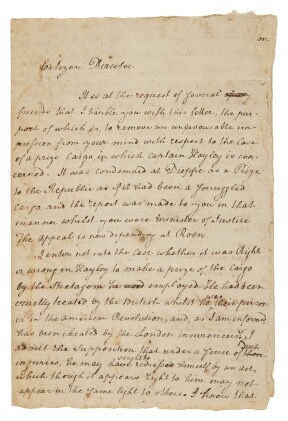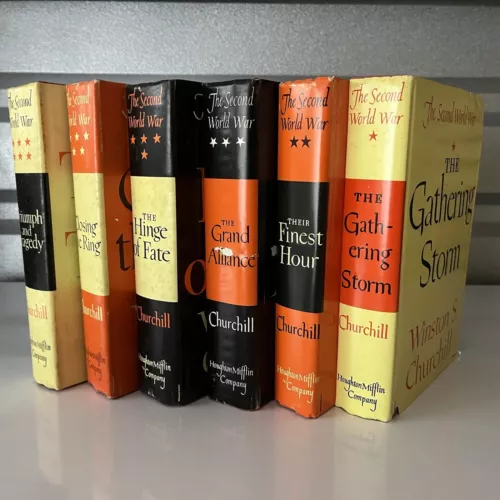AMAZING AND HISTORIC HANDWRITTEN LETTER FROM THOMAS PAINE MENTIONING THE AMERICAN REVOLUTION, PAINE’S ESSAY ABOUT MARITIME RIGHTS OF NEUTRAL NATIONS, GEORGE WASHINGTON, RESENTMENT AGAINST THE BRITISH, JAY’S TREATY AND THE FRENCH REVOLUTION. ONE OF THE FINEST PAINE LETTERS EXTANT.
Autograph letter signed (“Thomas Paine”) to the “Citizen Director” (Philippe-Antoine, Comte Merlin, of Douai), attempting to influence a French judicial review against an American friend.
2 1/2 pages (228 x 152 mm, untrimmed) on a bifolium, [Dieppe, France, ca. 1798-1799].
During the foment of the Quasi-War with France, Citizen Tom Paine writes on behalf of a Connecticut-born merchant-adventurer, Nathan Haley, who in 1797 had captured an American vessel, the Hare, supposedly because it carried British contraband: “It is at the request of several friends that I trouble you with this letter, the purport of which is, to remove an unfavourable impression from your mind with respect to the case of a prize cargo, in which Captain Hayley is concerned. It was condemned at Dieppe as a Prize to the Republic as if it had been a smuggled cargo, and the report was made to you in that manner whilst you were Minister of Justice. The appeal is now depending at Roen. I enter not into the case whether it was right or wrong in Hayley to make a prize of the cargo by the stratagem he employed. He had been cruelly treated by the British whilst he was their prisoner in the American Revolution, and, as I am informed, has been cheated by the London insurencers, {and besides those things the British made no ceremony of seizing American vessels} [phrase in angled brackets is written on the otherwise blank verso of the second sheet and indicated to be inserted by a caret]. I admit the supposition that under a sense of such injuries, he may have sought to redress himself by an act which though it appears right to him, may not appear in the same light to others.”
While living in Dieppe under the regime of the Directorate (1795–1799), Paine borrowed seven thousand livres from Haley, in part to underwrite the publication of Pacte maritime, Paine’s essay endorsing a compact that would protect the maritime rights and commerce of neutral nations during times of War. Paine’s letter continues, playing to his correspondent’s antipathy to Great Britain by referencing Haley’s delivering of Paine’s famous public letter to George Washington denouncing Jay’s Treaty, as well as his opposition to President Adams’s incumbent Federalist party: “I know that his resentment against the British and the British Party in America are high. It was Hayley who carried my letter to America addressed to the ex-President Washington, on the subject of the British [Jay’s] Treaty, to be printed. Your colleague Revilliere Lepeaux has read that letter in English; and I recompence the trust which Hayley executed for me by writing you this letter in his behalf. From every thing that I know of the case, and of the political sentiments of Hayley, who has been uniformly attached to the French Revolution, and has been engaged in several broils with the English Party in America [the Federalists] in supporting it, the cargo in question is not a smuggled cargo. The capture was a stratagem, and the tribunal of Dieppe has mistaken the stratagem for smuggling. Whether (as have just said) Hayley has done right or wrong in making the capture is not with me a question; but as he stands exposed to be pursued for it at some future day, by the owners or insurers of the cargo, it is no other than Justice that he be left with the means in his hands to defend himself, or to repair the injury if he has done one. But no error on his part can justify the Judgment at Dieppe. This, Citizen Director is my candid opinion of the case. …”
The “stratagem” that Paine refers to was complicated and legally and ethically questionable, although the French courts did side with Haley, who sometimes subscribed his name as a French naval lieutenant, on appeal: “American Nathan Haley (or Halley) was captain of the privateer Entreprenant of Dieppe in March 1797 when he captured the Hare, whose papers also showed a Nathan Haley as captain. Although Charles Cotesworth Pinckney informed Timothy Pickering that the two men were cousins, Rufus King reported to the State Department that Haley had brought his own ship in as a prize. The lower French prize tribunal reached the same conclusion and declared the Hare good prize to the state; the higher tribunal reversed the decision and declared both ship and cargo good prize to Haley” (note to a letter from Fulwar Skipwith to James Madison, 3 March 1804, The Papers of James Madison, Secretary of State Series, ed. Hackett, et al., 6:539–544).
Both Paine and Haley returned to America after the election of Thomas Jefferson and the defeat of the Federalist Party. In August 1803, Paine went to see Haley at Stonington, presumably to pay off some of his debt accrued in Dieppe. As Paine biographer John Keane notes, Paine ended up staying with Haley for several months, becoming an “itinerant lecturer on political affairs,” prognosticating the imminent conquest of Britain by Napoleon. Haley, who continued to travel between France and the United States, was appointed U.S. consul at Nantes in 1839 (cf. John Keane, Tom Paine: A Political Life, 1995, pp. 489–92).




